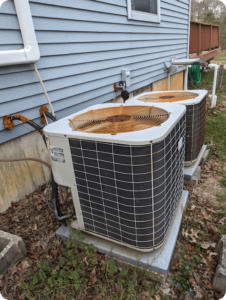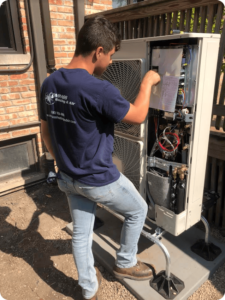Is Your Old AC Costing You Money?
 One of the questions we get a lot at Compass Heating & Air is when should we think about replacing our Air Conditioning (AC) system? The truth is that an aging system can start costing you more money towards the end of its life span, in higher energy bills, repair costs, and it can also cause more respiratory issues and decrease your indoor air quality as well, making the cost not just dollars and sense but your health as well.
One of the questions we get a lot at Compass Heating & Air is when should we think about replacing our Air Conditioning (AC) system? The truth is that an aging system can start costing you more money towards the end of its life span, in higher energy bills, repair costs, and it can also cause more respiratory issues and decrease your indoor air quality as well, making the cost not just dollars and sense but your health as well.
Lots of people think they are saving money by putting off an AC replacement. Purchasing an air conditioner is a big investment, and I totally understand how it may seem like buying a new AC is not the way to save money. There are a few factors here though. The truth is, you are going to have to replace it soon if you are already considering it. In the meantime, you are using an older, failing unit that is likely running up your energy bills. Yeah, you may have an initial investment to make for a new AC, but in the long run, it’s likely saving you money and improving your comfort.
In this article, I will tell you a little more about why an old air conditioner may be costing you more than you realize. If you are thinking about making the upgde to a new AC system, give us a call at (630) 504-8688, or contact us online!
But A New System Is Expensive. Don’t I Save Money By Running It Until It Dies?
We’ve all been there. A big piece of equipment- with a big price tag- is getting older, and you’re trying to figure out the best time to replace it. If you’ve got an air conditioning system that’s 15- 20 years old, your system is running towards the end of its projected life. Are there downsides to waiting until it dies to replace it?
Increasing Repair Costs
 Older systems, especially when they are out of warranty, are increasingly expensive to repair. Older units may still be using Freon as a refrigerant, but this was discontinued and is no longer being made, and the supply of replacement/recycled Freon is getting harder to find and it’s VERY expensive, driving up costs for any repair you might need.Think of repair costs on an older unit like repair costs on an older car.
Older systems, especially when they are out of warranty, are increasingly expensive to repair. Older units may still be using Freon as a refrigerant, but this was discontinued and is no longer being made, and the supply of replacement/recycled Freon is getting harder to find and it’s VERY expensive, driving up costs for any repair you might need.Think of repair costs on an older unit like repair costs on an older car.
You expect certain parts to wear out over time and be replaced, like tires, but when you start getting into the costs of a new condenser, new blower motors, new motors, and the like, the repair costs aren’t trivial, and the parts for older systems are harder to find as well. You start getting into the area where the cost of a new system may be a better investment than multiple pricey repairs of an older system.
And remember, that systems tend to die when they are being stressed, which means your system is more likely to fail on the hottest days of the year than on the coolest. That means service technicians are likely to be very busy, and the cost of emergency service can be substantial, adding additional costs you weren’t counting on.
Increasing Energy Cost
Due to legislation that’s demanded better energy efficiency from HVAC systems across the board, new systems are very efficient- and can typically reduce your energy costs by ⅓ to almost one half compared to older systems.
Older systems tend to work harder to give you the same level of comfort in your home, using more energy to do so, and making your energy bills go higher. Take a look at your energy bill for the hottest month of the year, and calculate what one third to one half of that bill would be. If your energy bill is $350 in July, for example, a new system might lower that bill to anywhere between $200 and $250, and will continue to save you money every month. These savings can help a new system start to pay for itself almost immediately.
Health Impacts
Older AC systems don’t move the air around your home as efficiently, which can decrease your air quality. You might start getting more upper respiratory infections, have more allergy symptoms, and you might not be removing dust and particles from your house as efficiently. Even with a filter change, the lack of force in the system will lead to a decrease in your indoor air quality and start to affect the health of you and your family.
Missing Out On Rebates and Tax Credits
There are currently rebates through your local energy company and tax credits under the Inflation Reduction Act for people choosing to upgrade to a more efficient AC system. Homeowners can qualify for up to $2,000 in tax credits for a qualified system replacement, so replacing your old system can not only save you money every month on energy bills, but you can save money on the upgrade by taking advantage of these programs.
The Bottom Line
While replacing your AC system is an expense, it’s one that can end up saving you money in the long run, that might be wasted on high energy bills and expensive repairs. And if you can replace your system in the Spring or Fall when technicians aren’t as busy, you’ll have a wider choice of equipment to choose from and spend less to get it installed than having to replace a system in the middle of a heat wave.
Planning ahead for a replacement can save you money today and tomorrow. If you are getting concerned about your system and whether you should consider replacing it, give us a call here at COmpass Heating and Air. We can do a full inspection of your current system and make recommendations so that when you are ready to replace your Air conditioning, you can do so when it’s right for you, and get a system that’s perfect for your home and budget!


